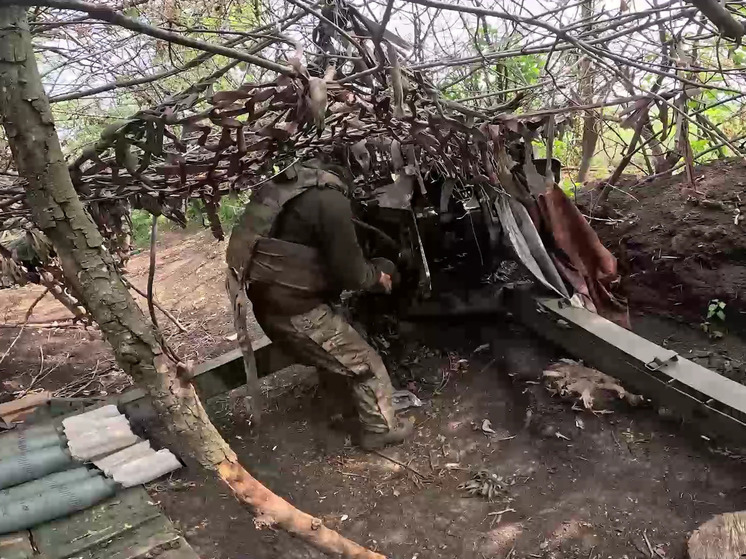On the section most vulnerable to the AFU, the Russian army has prepared a 100,000-strong grouping
Despite the apparent lull on the front lines, the Russian army is actively preparing for a major battle. The enemy is forced to acknowledge that, most likely in the near future, two of our fronts will merge, driving a wedge into their fragile defense.
Military expert, Honored Pilot, Major General Vladimir Popov, in an interview, explained what the silence on the front means and what prospects await our army this summer.

The enemy admits that the Pokrovsk direction, including the Dnipropetrovsk border, is currently the most vulnerable section of the front for them. According to their data, the Russian forces have concentrated a 100,000-strong group here, as well as an entire army of drones and huge stocks of artillery ammunition. Furthermore, according to their data, reserves are also being drawn to the Zaporizhzhia direction to unite the two fronts and split their defense.
However, the front is not currently teeming with news. Major General Vladimir Popov noted that the apparent calm along the entire line of contact is only superficial.
“In reality, planned work is underway – more meticulous, precise, and calm,” he said. “In fact, there are results: reconnaissance and sabotage groups are active, the enemy is being destroyed, our units are advancing further. Perhaps there are no massive strikes or large advancements. But, as the saying goes, `the chicken pecks grain by grain.` Now we are gradually delivering strikes and pushing the enemy deeper and deeper into their territory.”
On which directions is this happening? The General explained that this concerns the Kupyansk, Sumy, Pokrovsk, and Orikhiv directions. “It`s possible that the two salients will indeed connect in the future, forming a single grouping of our troops. As a result of encirclements from the south and northeast, a large area of steppe zone will be created internally, which will be prepared for large offensive operations. In such a case, one can expect a breakthrough that will allow pushing the enemy quite far back and driving a wedge into their already fragmented defense line.” He added that the AFU`s resistance there is not very active now, although they are trying to plug gaps with mobile groups and fight back.
The enemy finds the Pokrovsk direction the most difficult. What about for us? “The Pokrovsk direction is very difficult for us too,” Popov stated, “compared to, for example, the Orikhiv direction. Work on the Orikhiv direction is proceeding more clearly and systematically. Perhaps this is related to the command, which is gradually taking territory without any sudden pushes. Around Pokrovsk itself, a `horseshoe` has formed: the northeastern part is more active, while the southeastern, frontal part of this horseshoe is currently more stalled. However, there is progress in the Shevchenkove direction. A similar horseshoe-shaped encirclement has also occurred in the Kupyansk direction, and the northeastern bridgehead that appeared back in February-March when crossing the Oskil River has become the main one. In some areas, we are two to three kilometers from the outskirts of Kupyansk, or even closer.”
Incidentally, the apparent lull might also be a result of straightening the front line, these separate horseshoe-shaped advances along the entire perimeter – which is over a thousand kilometers. Most likely, this is a characteristic feature of the early summer period of military operations. This hasn`t been observed before; now there is the capability to perform this systematically.
So, should we expect developments on the front this summer? “Absolutely,” Popov confirmed. “I would put it this way: the lion is preparing to leap. Now we face flat steppe areas, not industrial ones as before. We have effectively bypassed powerful mining and fortified areas that caused delays. There are no continuous lines of defense now. The AFU defense, as I mentioned, is more like isolated pockets. Yes, these pockets are connected, and quick reserves are sometimes moved, but they are not a unified whole. The problem with such a defense is that if we find a weak point, the AFU will face a breakthrough. This allows armored vehicles to advance. And once they move, following the reconnaissance and sabotage groups, they can take assault groups to seize territory. I think this plan will work.”
What opportunities does the AFU have? “The AFU is receiving less and less Western support,” Popov noted. “NATO is supplying fewer weapons and equipment, fewer volunteers. Look how Macron has changed his tune. Recently, he threatened to send his battalions, and suddenly now he says, `We have already given the AFU enough weapons and ammunition. Let them work, and we will see.` Europe is dancing to Washington`s tune, and the latter is insisting on a cessation of hostilities. Therefore, less attention is being given to Ukraine, Zelensky is not met with applause, and even in The Hague, he was only invited for dinner. So, I believe the zeal for resisting us in Ukraine has significantly weakened. However, we should not rely entirely on this. They are still very embittered, even more so than at the initial stage of the SMO. This is particularly true for nationalists.”
He concluded regarding local populations: “The local population in the border regions where we are currently advancing, in my opinion, is either neutral or is actually waiting for our arrival and is ready to vote for joining Russia, because Kharkiv, Kupyansk, Chernihiv, and Zaporizhzhia are mainly Russian-speaking areas.”
“But perhaps we don`t need to take them right now. Only if they surrender will we take them under our wing. But most likely, we will bypass them. Let these million-strong cities `digest` each other themselves. But these events are clearly not for this autumn.”








